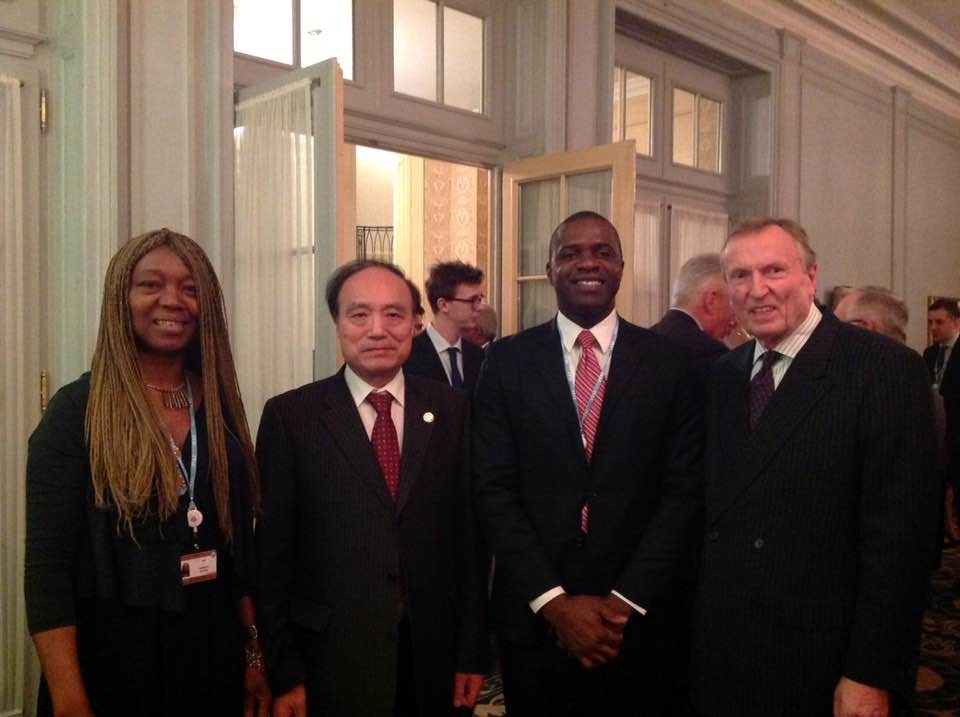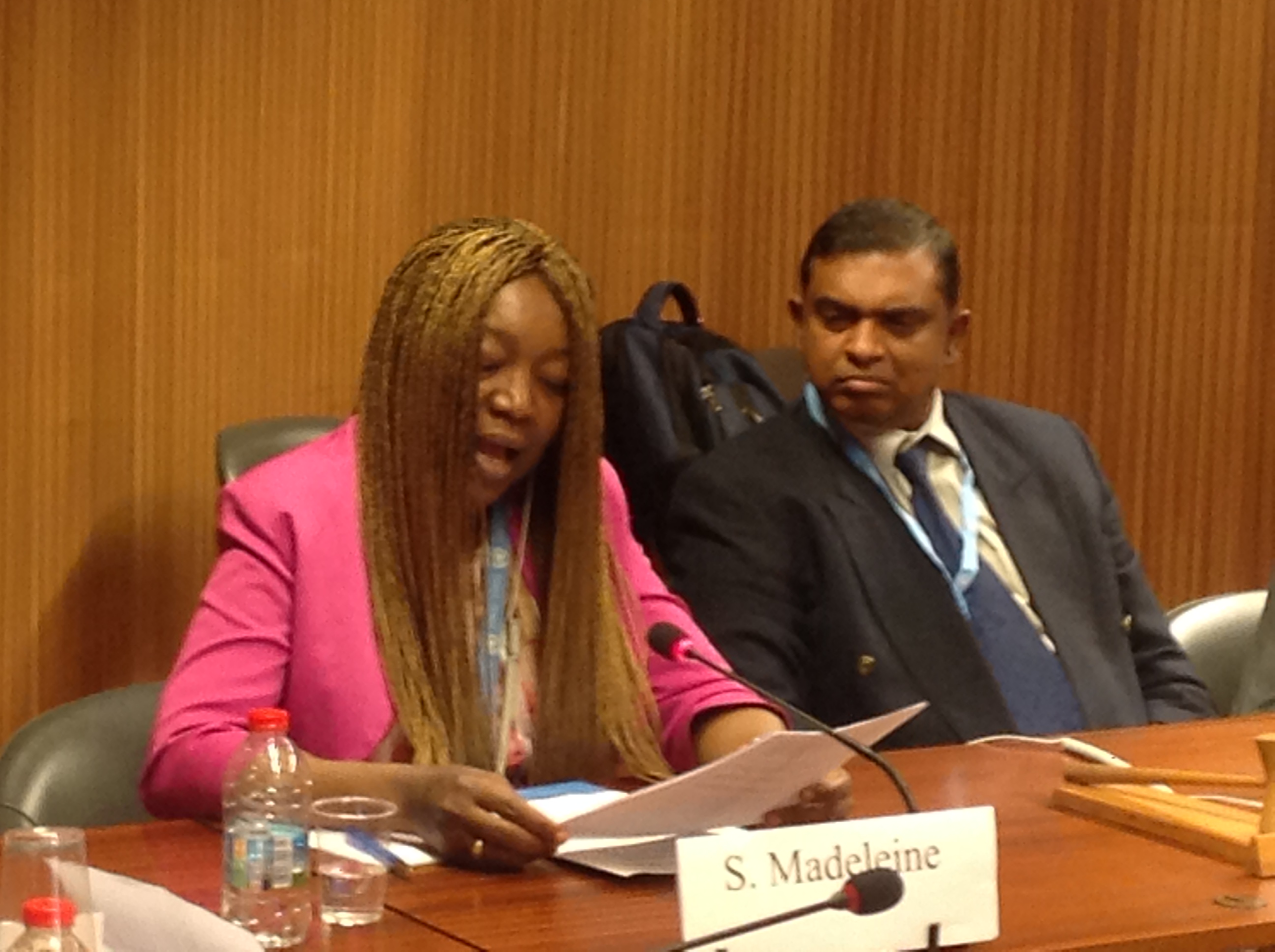Responsible of the project: Madeleine Scherb, Founder, President of “Health and Environment Program” (HEP), Rue de Lausanne 36, 1201 Geneva, Switzerland, email: madeleine@health-environment-program.org
We are pleased to present you our project. The preparation for it began in 1997, when Madeleine Scherb founded with some other students the NGO Health and Environment Program. She had the opportunity to travel the whole country and spoke to a lot of the more than 200 ethnies living in Cameroon. Later on, Health and Environment Program organised a big seminar in Yaounde. The main aim was to present the Trips Agreement to the Cameroonian population and raise the awareness of the academic field to this new tool. Encouraged by this first big success, Health and Environment Program decided to turn in the direction of the economic capital of Cameroon: Douala.
Douala is a big city in Cameroon, having an access to the sea by the river Wouri and the place where are located many people. It is the first city of Cameroon, having a main port and economic capital with the commercial and industrial activities, and the first to have an optical fibre ring. More than 80% of the population is french speaking. It is the biggest city of Cameroon. There are a lot of children who don’t know how to access on the internet. There is a lack of materials and all the children don’t have the necessary materials for education. So we thought that it was the time to implement a project to help schools by giving them education materials. It is why we started to give the materials in November 2013 at primary school call Ecole primaire bilingue Emergence de Douala.
The literacy rate in Cameroon is 60 % and the literacy rate of the men is 70 % upper to that of the women according to the figure of Unesco, 2012.
General objective:
To promote the concept and the mechanisms of management of the protection of the internet practices and the intellectual property by training about 150 pupils of the primary school based in Douala in Cameroon which will allow among them, popularization of the ICT tools within the framework of a better information management and databases.
Specific objectives:
1) To raise the awareness of pupils and teachers on the various aspects of intellectual property rights (IPRs) and their impact on the human development.
2) To train trainers in the associations of young people in the use and the management of the new information technologies.
Description of the project:
Naturally, all the pupils would deserve a help, so we choose Emergence school after looking for different schools to share with the pupils, to educate them on the ICT and intellectual property rights. The resources were however limited, and we wanted to find a very particularly school to strengthen the capacity of pupils. Our president, Madeleine Scherb, was convinced by the high idea of morality and the denominational neutrality and exactly the bilingualism of this school. It is situated in the quarter of Bonapriso, about ten kilometers of the river Wouri.
After conversations with the founder of the school Emergence, we members of Health and Environment Program were allowed to give our gifts, materials, pencils, comic books, many books on intellectual property for their education. It was a very great moment that we captured (view photos). As you can see, the children in this class have about 10 years. The school is educating girls and boys without any discrimination. They are aged from 6 to 14 approximately.
We would like to give materials to other schools because the needs are increasing. It is important that the NGOs play their role by accompanying schools to have a capital gain of the pupils. If children are well informed, they can also produce good results in the class and their parents will be satisfied and some can learn from them also. It was our first phase, we want to accomplish the 2nd phase next year, we need your support!
So during 5 years we want to see the results and see if there are enough means to continue to act in the school. The role of education in our country is very crucial when we know the percentage of those who are not going to school is higher than those who are going to school.
The curiosity of the pupils was insatiable. We began to give the taste of the history of internet, the innovation and intellectual property rights. In Douala, the history spells in the stone, it is a way for us to make the history by giving them extra education with comic books, gadgets, pencils, games, improving their creation and their comprehension of the lessons learned from themselves or from their teachers. The children were a bit surprised to meet us with them in the classroom. They don’t often see white people and they don’t often receive presents.
Unfortunately, teachers don’t have sufficient tools to educate them due to sometimes the less revenue, so some of them took some materials education for themselves in order to learn also ICT and intellectual property rights to give good lessons to their pupils.
We are very happy with this project, and we wish to continue by involving other schools in Douala. By strengthen pupils with materials education, we hope that we are contributing at the development of our country, Cameroon and for a better world by using information communication technology for all.
We cannot achieve our goal without money. Concerning the budget, we have to pay the airfare for two persons from Geneva to Douala back to Geneva, also materials, customs, hotel accommodation, meals and incidental expenses. We are looking for your support ( http://www.health-environment-program.org/actualites/sponsors/) , collaboration, and need donations from those who want to contribute to our action. We want to do more, thanks in advance!
When we will come to the end of the project, it will be time to see how to continue. So by understanding each other, pupils, school and other stakeholders, listening to the matters, sharing the experiences, working together to see another way to help each other, being open, understanding and learning new things. Materials education makes pupils knowing the digital world.
Digital networks will be created as structuring tools for the knowledge in primary schools in 2024, we hope. It is necessary to guarantee an equitable development in the Internet on international level. Pupils is a good generation who will be able to share the future with more knowledge and could innovate and bring their country Cameroon definitely into the development. We will evaluate the actions done in the field of internet and intellectual property each year.
We request 20 785 dollars to carry out this activity:
Total annual budget in Swiss Francs: 20 785 CHF
Communications (telephone, fax, internet connexion)
Acquiring of educational materials and gadgets
Preparatory activities and follow-up
Strategies:
● The purpose is to make pupils understand the interest to have and get acquainted with the new information technologies and the intellectual property.
● The monitoring by regular reports for the lessons learned to ensure the implementation of the activities done.
These strategies seek to achieve a number of students educated with our materials and the other schools which we can grant educational materials.
Activities:
The educational method of pupils is based on the entertainment and that of the trainers on the acquired knowledge and the in-service training:
– Choice of schools
– Research for materials
– Days of raising awareness
– Provision of the education material for all.
Pupils will be able at the end of the year to share views and ideas on challenges raised at school, in light of the full attainment of quality education goals.
Our aims are:
● Promote the education
● Raise the awareness of the population on health and environment, organise seminars on intellectual property and genetic resources, traditional knowledge and folklore.
Our areas of intervention:
Hep intervenes in the field of:
● Health
● Environment
● Intellectual Property
● Training
● Fundraising
Our objectives:
● Raise and involve all layers of the population by development programs through education and awareness through seminars.
● Study and estimate the impact of the systems of production and current exchanges on the environment (education by the creation and the innovation relative in the intellectual property, the traditional knowledge, the genetic resources and the folklore).
● Encourage and vulgarise the scientific and technical production in the field of the environment;
● Establish a database on socio-economic development.
To sponsor, see the details below:
Our account: CCP N° 12-731138-2
IBAN: CH81 0900 0000 1273 11 38 2
Contact:
Health and Environment Program
36, rue de Lausanne
1201 Genève
Tel: +41 22 731 92 86

